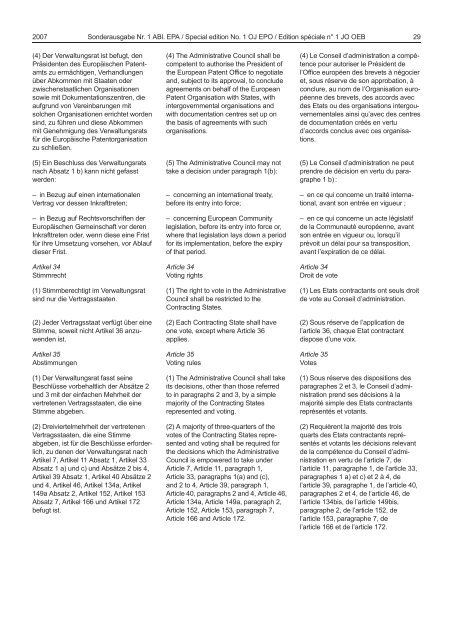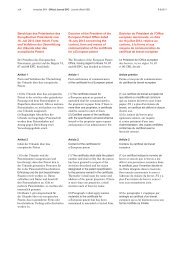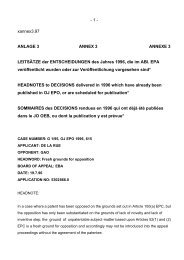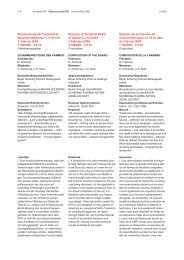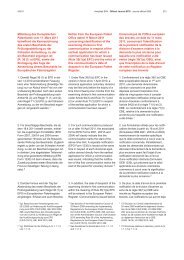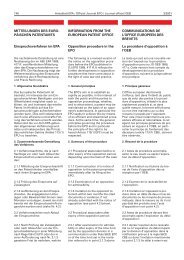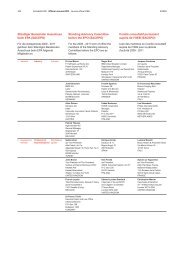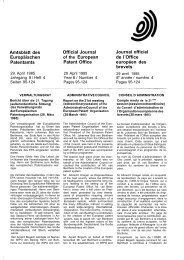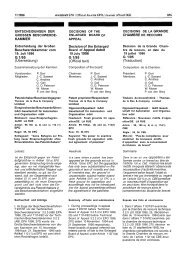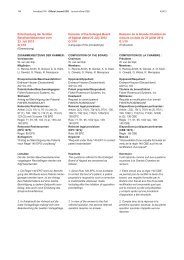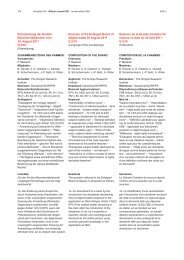Sonderausgabe 1 - European Patent Office
Sonderausgabe 1 - European Patent Office
Sonderausgabe 1 - European Patent Office
You also want an ePaper? Increase the reach of your titles
YUMPU automatically turns print PDFs into web optimized ePapers that Google loves.
2007 <strong>Sonderausgabe</strong> Nr. 1 ABl. EPA / Special edition No. 1 OJ EPO / Edition spéciale n° 1 JO OEB 29<br />
(4) Der Verwaltungsrat ist befugt, den<br />
Präsidenten des Europäischen <strong>Patent</strong>amts<br />
zu ermächtigen, Verhandlungen<br />
über Abkommen mit Staaten oder<br />
zwischenstaatlichen Organisationen<br />
sowie mit Dokumentationszentren, die<br />
aufgrund von Vereinbarungen mit<br />
solchen Organisationen errichtet worden<br />
sind, zu führen und diese Abkommen<br />
mit Genehmigung des Verwaltungsrats<br />
für die Europäische <strong>Patent</strong>organisation<br />
zu schließen.<br />
(5) Ein Beschluss des Verwaltungsrats<br />
nach Absatz 1 b) kann nicht gefasst<br />
werden:<br />
– in Bezug auf einen internationalen<br />
Vertrag vor dessen Inkrafttreten;<br />
– in Bezug auf Rechtsvorschriften der<br />
Europäischen Gemeinschaft vor deren<br />
Inkrafttreten oder, wenn diese eine Frist<br />
für ihre Umsetzung vorsehen, vor Ablauf<br />
dieser Frist.<br />
Artikel 34<br />
Stimmrecht<br />
(1) Stimmberechtigt im Verwaltungsrat<br />
sind nur die Vertragsstaaten.<br />
(2) Jeder Vertragsstaat verfügt über eine<br />
Stimme, soweit nicht Artikel 36 anzuwenden<br />
ist.<br />
Artikel 35<br />
Abstimmungen<br />
(1) Der Verwaltungsrat fasst seine<br />
Beschlüsse vorbehaltlich der Absätze 2<br />
und 3 mit der einfachen Mehrheit der<br />
vertretenen Vertragsstaaten, die eine<br />
Stimme abgeben.<br />
(2) Dreiviertelmehrheit der vertretenen<br />
Vertragsstaaten, die eine Stimme<br />
abgeben, ist für die Beschlüsse erforderlich,<br />
zu denen der Verwaltungsrat nach<br />
Artikel 7, Artikel 11 Absatz 1, Artikel 33<br />
Absatz 1 a) und c) und Absätze 2 bis 4,<br />
Artikel 39 Absatz 1, Artikel 40 Absätze 2<br />
und 4, Artikel 46, Artikel 134a, Artikel<br />
149a Absatz 2, Artikel 152, Artikel 153<br />
Absatz 7, Artikel 166 und Artikel 172<br />
befugt ist.<br />
(4) The Administrative Council shall be<br />
competent to authorise the President of<br />
the <strong>European</strong> <strong>Patent</strong> <strong>Office</strong> to negotiate<br />
and, subject to its approval, to conclude<br />
agreements on behalf of the <strong>European</strong><br />
<strong>Patent</strong> Organisation with States, with<br />
intergovernmental organisations and<br />
with documentation centres set up on<br />
the basis of agreements with such<br />
organisations.<br />
(5) The Administrative Council may not<br />
take a decision under paragraph 1(b):<br />
– concerning an international treaty,<br />
before its entry into force;<br />
– concerning <strong>European</strong> Community<br />
legislation, before its entry into force or,<br />
where that legislation lays down a period<br />
for its implementation, before the expiry<br />
of that period.<br />
Article 34<br />
Voting rights<br />
(1) The right to vote in the Administrative<br />
Council shall be restricted to the<br />
Contracting States.<br />
(2) Each Contracting State shall have<br />
one vote, except where Article 36<br />
applies.<br />
Article 35<br />
Voting rules<br />
(1) The Administrative Council shall take<br />
its decisions, other than those referred<br />
to in paragraphs 2 and 3, by a simple<br />
majority of the Contracting States<br />
represented and voting.<br />
(2) A majority of three-quarters of the<br />
votes of the Contracting States represented<br />
and voting shall be required for<br />
the decisions which the Administrative<br />
Council is empowered to take under<br />
Article 7, Article 11, paragraph 1,<br />
Article 33, paragraphs 1(a) and (c),<br />
and 2 to 4, Article 39, paragraph 1,<br />
Article 40, paragraphs 2 and 4, Article 46,<br />
Article 134a, Article 149a, paragraph 2,<br />
Article 152, Article 153, paragraph 7,<br />
Article 166 and Article 172.<br />
(4) Le Conseil d’administration a compétence<br />
pour autoriser le Président de<br />
l’<strong>Office</strong> européen des brevets à négocier<br />
et, sous réserve de son approbation, à<br />
conclure, au nom de l’Organisation européenne<br />
des brevets, des accords avec<br />
des Etats ou des organisations intergouvernementales<br />
ainsi qu’avec des centres<br />
de documentation créés en vertu<br />
d’accords conclus avec ces organisations.<br />
(5) Le Conseil d’administration ne peut<br />
prendre de décision en vertu du paragraphe<br />
1 b) :<br />
– en ce qui concerne un traité international,<br />
avant son entrée en vigueur ;<br />
– en ce qui concerne un acte législatif<br />
de la Communauté européenne, avant<br />
son entrée en vigueur ou, lorsqu’il<br />
prévoit un délai pour sa transposition,<br />
avant l’expiration de ce délai.<br />
Article 34<br />
Droit de vote<br />
(1) Les Etats contractants ont seuls droit<br />
de vote au Conseil d’administration.<br />
(2) Sous réserve de l’application de<br />
l’article 36, chaque Etat contractant<br />
dispose d’une voix.<br />
Article 35<br />
Votes<br />
(1) Sous réserve des dispositions des<br />
paragraphes 2 et 3, le Conseil d’administration<br />
prend ses décisions à la<br />
majorité simple des Etats contractants<br />
représentés et votants.<br />
(2) Requièrent la majorité des trois<br />
quarts des Etats contractants représentés<br />
et votants les décisions relevant<br />
de la compétence du Conseil d’administration<br />
en vertu de l’article 7, de<br />
l’article 11, paragraphe 1, de l’article 33,<br />
paragraphes 1 a) et c) et 2 à 4, de<br />
l’article 39, paragraphe 1, de l’article 40,<br />
paragraphes 2 et 4, de l’article 46, de<br />
l’article 134bis, de l’article 149bis,<br />
paragraphe 2, de l’article 152, de<br />
l’article 153, paragraphe 7, de<br />
l’article 166 et de l’article 172.


